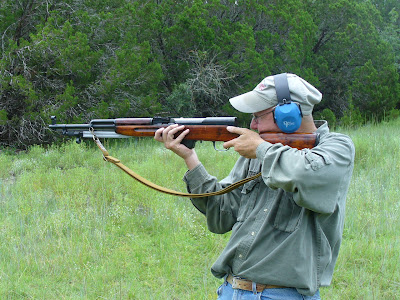The figures looked about like what I've seen elsewhere. It basically showed how small our casualty figures for this war are compared to all the other conflicts we've been in. It claimed that the recent spike in yearly casualties from this war don't amount to much of a real annual increase in casualties, looking at figures from about 1980 to 2003. Those figures show not much of an increase in overall casualties suffered in each year. Bottom line of the email was that we should be concentrating on winning the war rather than how many American lives are being lost in the process, but that the media coverage of the war keeps us from being able to do that.
That's a refrain one hears a lot among supporters of the war, blaming the way the main stream media covers wars for destroying public support for this conflict and the sacrifice necessary to win it. Same refrain we heard in Vietnam. Mushy forwarded this to me, thinking' it might spark something in my mind, and maybe turn into a post, and it has. Hell, I'm always sendin' him nasty shit to fuel his Silverbacks appetite, not to mention keepin' his heart rate up on occasion. I appreciate him returnin' the favor.
I was thinkin' about my buddy Mushy yesterday afternoon in class. Took one of my history classes through the Vietnam war (Mushy's a vet), from the early French years, and the Eisenhower and Kennedy periods, up to '68 and the Tet offensive. It sparked a brief discussion in class, a class sprinkled with soldiers who have all been in Iraq and will probably have to go back soon. We talked briefly about the similarities and differences between the two conflicts. I took my other class, which some of these same soldiers are taking, from Sherman's March in late 1864 to the beginning of Reconstruction in 1866, telling them about the 617,458 or so killed in that war, including about 40 to 50% of the Souths adult male population being killed or wounded. It always amazes them to hear those figures. Casualties like those seem so otherworldly to us now, but they helped shape the country we all grew up in in the 20th century. The thing to realize about this current conflict is, a hell of a lot of guys and gals that would have died in other wars from their wounds don't die in Iraq because of advances in medicine, body armor and protection.
We used to see a lot of people dying from horrible wounds in other conflicts, as well as disease. But now people are flown right to a hospital and get first rate medical attention, and they don't die from those conventional wounds as often. Deaths from disease hardly factor in anymore. Only about 204,000 soldiers died in battle in the Civil War. The rest of the 617, 458 died from disease. The soldiers who are wounded in this war live on and recover, sometimes with horrible bodily injury and brain damage from an IED, but they don't die. Many fewer are dying from getting shot or wounded by shrapnel, but many people do die from being blown up and suffering fatal internal trauma that their body armor can't protect them from.
The number of wounded in this current war so far is something like 30,ooo to 35,ooo, but the number of our killed is only around 3700, after four years of escalating conflict. I tell my students in my history classes that those figures are amazingly small compared to any war we've ever been in (WW2, battle of Iwo Jima - about 40 days of fighting - 6,821 killed and 20,000 total US casualties), Thing is, that really doesn't matter. The way this war is covered in the press, we focus on each individual casualty, see film of his or her mother or kids on TV, and are left wondering if the cause we're fighting for is worth this personal cost. That was never done over any of the men who died at Iwo Jima. There was a certainty about what we were fighting for then, and that is the real difference between then and now.
In WW2 it was a given that the cost was worth it. In Korea, a bit less obvious. In Vietnam, a lot less obvious, and now it's the same. We may have lost the capacity to do what we need to do to win, if it means serious casualties, and if the cause of the fight isn't obviously clearly necessary. It's easy to blame the media for not telling the story, but that isn't their job. Bush has never clearly articulated the reason why we should sacrifice our soldiers to this cause, particularly since the original cause crumbled as we discovered there were no WMDs. Many of us still believe the cause is a just one, but the fact is, if a leader can't articulate to the public the reason why we should fight and die, his opponents will inevitably articulate the reasons why we shouldn't. That is a fact of politics, and if we who supported this war can't successfully communicate the reasons for the fight, then the fight should never have been started.
Thinking about the issue, one realizes the reason why the press was heavily censored in WW2. The press has the power to mold peoples attitudes about the things they see and hear. There is an old adage that says the press can't really tell people what to think, but it does tell people what to think about; slowly molding peoples perceptions by showing them one story after another that creates a picture. Peoples attitudes can, over time, be molded by what they are shown and left thinking about. An image tells a thousand words, right?
So the fact that the press, by it's nature, tends to dramatize the negative and gloss over the positive, will have a huge impact on the publics perception of this or any conflict. Seeing nothing but body bags, or the left over damage from a suicide bomber, says nothing about whether the war should or shouldn't be fought, any more that seeing the bodies of dead American marines floating in the surf at Guadalcanal said that we shouldn't be fighting the Japanese in WW2.
The public was given the reasons for fighting WW2 by a press that was acting like a cheer leader for the FDR administration. Now, since the Vietnam days, the press has taken on this adversarial role, and thinks it has to stay neutral to do it's job. Many proponents of the war see that neutrality as treason. Others point out that the propensity of the media to concentrate on the violence (If it bleeds, it leads), prevents positive stories from being told. Well, that's all true, but again, it's not the medias job to keep the public in a positive mood about the war.
Maybe if we had another nation attack us, and not a bunch of crazy, nationless rag heads, people would be able to get their mind around the need for bloodshed, as they did immediately after 9-11 when we went into Afghanistan. Maybe then the public would be willing to do the hard things to win, but I doubt it. I think we're too spoiled now and don't want to pay any real price to win. Helps explain why we can't seem to fix any of the real problems we have as a nation. Our political process has evolved into one in which everyone expects to get something for nothing, and different groups are pitted against one another rather than brought together.
Anyway, this is drifting into something else, and I'll save that for later. Going back to work. Have to finish rehashin' these wars and stuff so I can get this semester finished and jet out of here. Road trip drama is approaching. More on that later too. Cheers.






























































